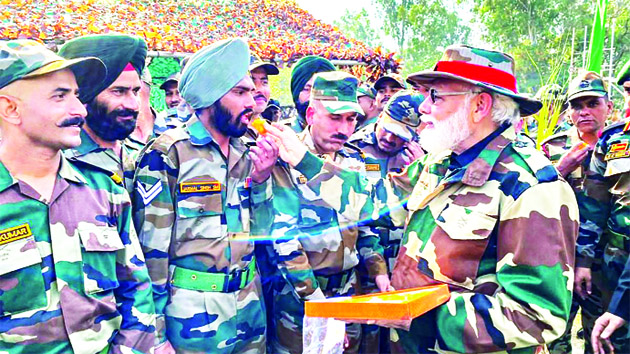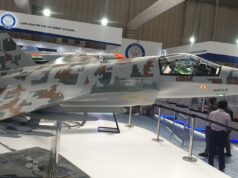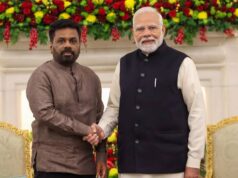Celebrating Diwali the Armed Forces way

By Colonel Satish Singh Lalotra
You have to find what sparks a light in you so that you in your own way can illuminate the world’—Soldier’s diary.
Diwali (also spelled as Divali or Deepwali) ,the festival of lights is one of the major holidays of Hindu religion celebrated equally by Jains and Sikhs and Buddhists , off course marking their own religious milestones coinciding with the festival of lights. The 5 day festival marks the beginning of the Hindu New Year and occurs during the final three days of ‘Dark half’ of the lunar month ‘Ashvina’ and the first two days of the light half of the month of ‘Kartika’ in the Vikram calendar. It occurs in late October or November of the Gregorian calendar. The entire diaspora of Hindu race spread from Gibraltar to Japan and from Madagascar to Oslo go into a rapturous overdrive of celebrations on this occasion. Can the armed forces of India be aloof from such momentous celebrations? Off course not. A period from November 10th till 14th starting from Dhanteras and ending with Bhai Dooj will be the hallmark of this year’s Dewali celebrations. The whole country will be on a joyous mood with friends and family on such an occasion. But spare a thought for the soldier who did not. He kept vigil on the borders, on the LOC, on Siachen and in Ladakh. He did not go home. He was not with his family .He was vigilant on the borders in this terrible cold so that the nation could snuggle for a peaceful sleep after due celebrations as demanded by the occasion. Since Armed forces are the essential glue made from a multifarious of classes of troops gelling into one continuous flow of thought and action ,festival like Dewali is one such religious cum joyous occasion that furthers to obliterate the diversity of class, composition, race, language etc as found in these forces. It is as if this festival has transcended beyond the confines of above mentioned fissures that divides a nation.
The absolute power to meld such fissures of diversity in the armed forces by the festival of Dewali shows that it has seeped deep into the sinew of Indians putting them on a pedestal that is an envy of many a country of this world. The three wings of the armed forces stretched from the parched lands of Thar desert in Rajasthan to the unforgiving heights of Siachen Glacier to the leech infested jungles of Arunachal Pradesh have found their own level of celebrations to ring this festival of lights in its true fashion. The primary body of troops that is found in the army is that of a battalion or regiment composed either of all classes or of a single class composition commanded by a CO, or the commanding officer who is like a father figure for all his troops. It is this institution of the Commanding officer that sets the ball rolling for all celebrations in his unit by becoming a beacon of camaraderie and bonhomie amongst his troops on an occasion like Dewali. Generally the CO and his Subedar Major chalk out the blue print of celebrations in consultations with their juniors and as deemed fit keeping the sensitivity of the area of their deployment or duties. In fact the prelude to Dewali begins about 20 days before when on the Dusshera day a special ‘Sashtra puja’ is performed by the unit with a massive display of its arms and ammunition ,vehicles, instruments and the like invoking the might of Goddess Durga as ‘Power incarnation’ and ‘slayer of demons’ of the world. In some units of pure class composition particularly the ‘Gurkhas’ and ‘Marathas’ even animal sacrifice is resorted to .In a typical peace area with the families of troops too residing alongside the same station the festivities usually revolve with activities involving a unit Mandir parade invoking the blessings of various Gods and Goddesses, a ‘Bara khana’ or a Dewali mela arranged at a centrally located place with active participation of all ranks and their families showcasing their individual and collective talents. The Dewali mela may involve a cracker show as also stalls in all their finery showcasing eatables from the various sub units put on display made by the families of the troops or the delicacies outsourced from the local market. An enthusiastic unit or body of troops may put up a glittering fashion show or dance competition adding that extra sheen to the festival of lights.
If the unit happens to be deployed in an operational area away from the families it doesn’t take away the buoyancy and spring from the feet of all ranks in ringing this festival of lights in its true sense. In fact all and sundry in order to remove the void created in their lives due to exigencies of service go hammer and tongs in celebrating this ‘festival of festivals’. Since it denotes the victory of good over evil, and spreading of light amidst the gloom of darkness cast by the ‘Amayasva’, many a time as a mark of morale boosting the unit resorts to firing from its weapons on to the enemy deployed in front of its location in an operational area to help gain morale and also material ascendency over its arch enemy. I remember distinctly way back in November 2003, while deployed in Gurez valley my unit opened up across the LC on the occasion of this festival that coincided with the final announcement of ceasefire between us and our western neighbour Pakistan. Similarly immediately after my Siachen tenure and subsequent de-induction to ‘sugar sector’ on Himachal -Tibet border in November 1996, my Tibetan troops who were mostly of Buddhist origin shed all their pretensions and partook in the Dewali celebrations at ‘Rupa valley with gay abandon since it was their first major festival immediately after OP-Meghdoot.’. Many may not be aware that even in the Buddhist religion the festival of lights also holds an equal importance. It is said that on this day Emperor ‘Ashoka’ was converted to Buddhism disenchanted by his own deeds as was perpetrated by him in the battle of Kalinga. Leaving aside these morale boosting tid-bits in a field area, during Dewali the troops who are deployed in penny packets in their posts and picquets guarding the frontiers too celebrate this festival with equal gusto.
As mentioned in previous paragraphs, armed forces are the microcosm of a bigger entity i.e a nation, since they resemble the country with all the diversities of language, culture, ethnicities, all rolled into one big force to reckon with. Keeping the above ethos of multiculturalist foundation of our armed forces the present PM Narendra Modi since 2014 has been at the forefront of heralding the festival of lights with the ‘Sentinels of our frontiers’ (the armed forces) of the country signaling to each citizen of India that it is these uniformed men and women who tirelessly guard our 15000 kms of national boundaries from external depredations enabling us to celebrate Dewali in our homes peacefully. Pulling himself out of the confines of the national capital the prime minister has been on the trot traversing areas like Longewala, Siachen glacier , Nowshera, Kupwara interacting with the forward most troops deployed over there to bring a little cheer in the lives of these men and women on the occasion of Dewali . Men bearing the profession of arms serve with the concept of ‘Unlimited liability’ that has no second takes while undertaking their professional duties.
It is these little gestures that act as mitigating factors towards reducing this ‘unlimited liability’ of a soldier though in a small way it may be. Any expenditure or effort towards accomplishment of the above is the premium to be paid for the national insurance of its security. During the depression of the 1930s, when there was a cut in defence budget, General Douglas MacArthur chief of the US army went to the president Franklin D. Roosevelt to dissuade him from making cuts in the defence budget. The president was unconvinced. As a parting shot, General McArthur said, Mr President with enemy bayonet piercing his abdomen and he spits out his last curse, I do not want the bane to be McArthur but Roosevelt. It is said that the US president changed his mind and opened up the purse strings for US armed forces. The detractors of our prime minister downplaying his outreach to the troops during such festivities in terms of the expenditure incurred as well as time spent would do well to remember the prophetic words of the US General as stated above. Towards this end when we light our homes in brightness this year, it would be appropriate to reflect on what it takes for us to celebrate not just our Dewali, but our freedom, our rambunctious democracy, our civil rights and ironically our right to be uncivil. Our uniformed brothers and sisters have proven their worth on every occasion the nation has needed them. This Dewali might be a good time for the rest of us to start deserving them.
(The writer is a retired army officer)




